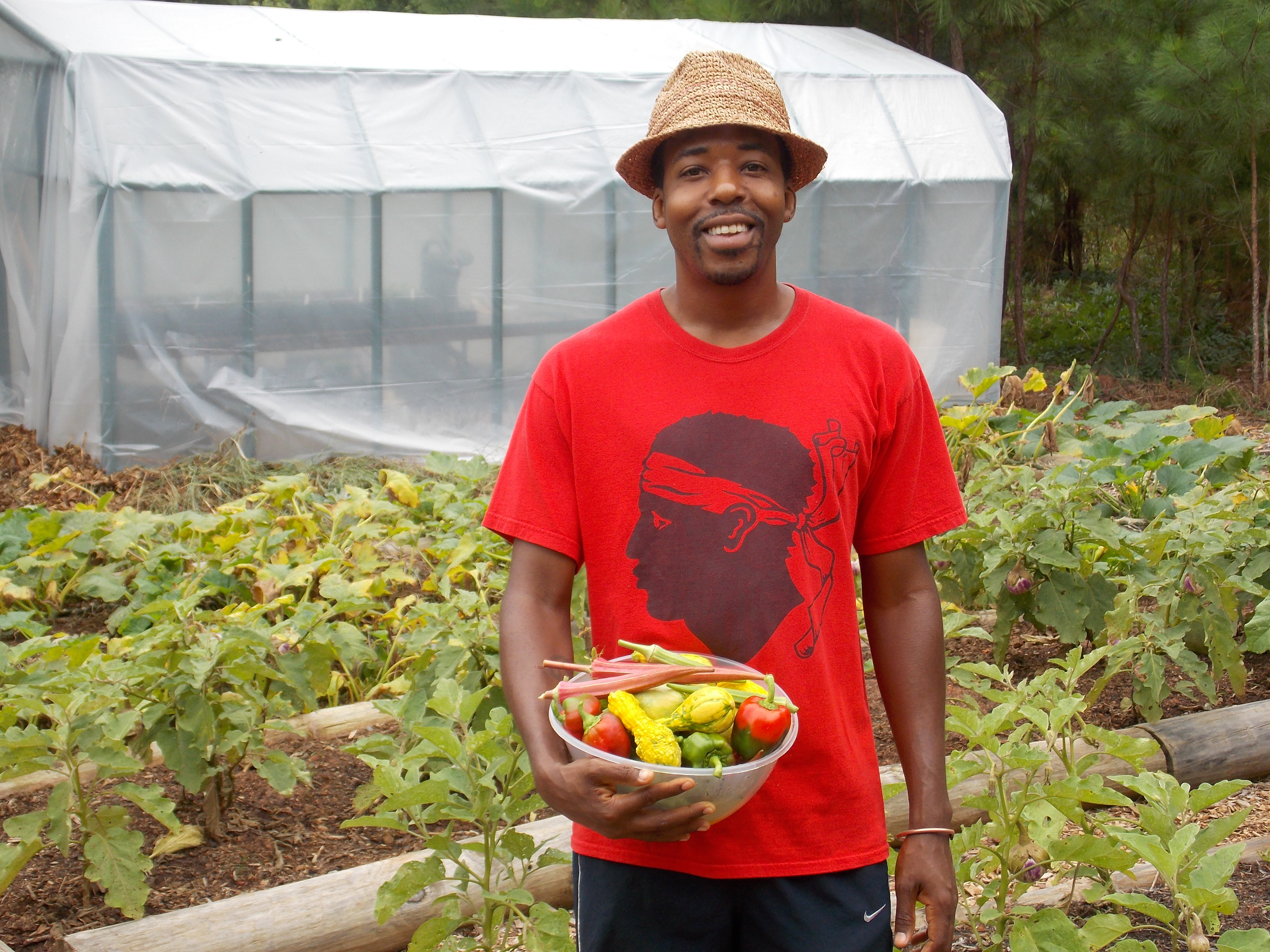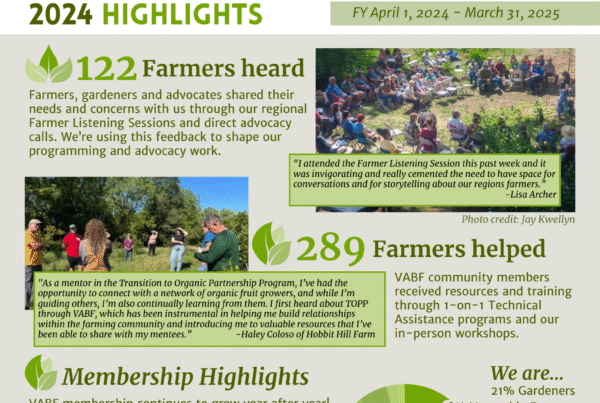USDA Agency Relocation Update and Next Steps
Thank Virginia’s Senators for Co-sponsoring Agriculture Research Integrity Act
On June 13, Agriculture Secretary Sonny Perdue announced that the Economic Research Service (ERS) and the National Institute for Food and Agriculture (NIFA) will be relocated to the Kansas City, MO area. As discussed in previous articles, this move, undertaken without due consultation with either Congress or agricultural stakeholders nationwide, will seriously undermine the capacity of these two agencies to carry out their mandated missions for US agriculture. Already, many valuable employees have left the agencies to retire or seek other employment rather than uproot their families and relocate.
Congress continues to push back in two ways. The House Agriculture Appropriations Subcommittee has denied funding for relocation for FY20, and the Agriculture Research Integrity Act (ARIA) has been introduced in both chambers of Congress, by Rep. Chellie Pingree (D-ME), and Senator Van Hollen (D-MD). ARIA would stop the impending move and keep both agencies within the greater DC area. Virginia Senators Tim Kaine and Mark Warner joined Senator Van Hollen and six other Senators as original co-sponsors of the Senate bill. Please call their offices to thank then for taking this stand!
We did score one significant win already. Secretary Perdue also announced on June 13 that, based on concerns raised by Members of Congress and agricultural scientists across the US, the ERS will remain within the Research, Extension, and Economics mission area, and will not be shifted to the Office of the Chief Economist.
At this time, National Sustainable Agriculture Coalition (NSAC) is gathering organizational sign-ons to a letter to the Senate Appropriations Committee urging them to join the House in denying funding for relocation of NIFA and ERS.
For more on this issue, see NSAC blog posts at http://sustainableagriculture.net/blog/ers-nifa-site-selected/ (June 13), http://sustainableagriculture.net/blog/usda-research-agencies-needed-in-washington/ (June 6), http://sustainableagriculture.net/blog/release-fy-2020-house-agriculture-appropriations-bill/ (May 22), and http://sustainableagriculture.net/tags/aria/ (Feb 14).
Agriculture Appropriations Process: Big Wins in the House of Representatives
In addition to denying funding for the proposed relocation of NIFA and ERS, the House Appropriations rejected the President’s proposals to cut agricultural spending, eliminate CSP and ATTRA, and slash SARE funding by half. The House Appropriations bill for Fiscal Year 2020 would provide robust funding levels for many key programs including:
- SARE funding at $45 million (up from $37 M in 2019)
- An additional $10 M for Farming Opportunities Training and Outreach.
- An additional $23.4 M for Local Agriculture Markets Program.
- $3 M for Appropriate Technology Transfer for Rural Areas (ATTRA), up from $2.8 M.
- Organic Transitions at $8 M (up from $6 M).
- Full funding for conservation programs is maintained.
Now we need to hold on to as many of these wins as possible in the Senate – a heavy lift, but (IMHO) not hopeless – after all, it was a Republican-majority Senate that led the charge on a balanced, bipartisan 2018 Farm Bill.
For more information on Appropriations, see the June 7 NSAC blog post at http://sustainableagriculture.net/blog/house-appropriations-committee-passes-fy-2020-bill/.
Congressional Hearings on Agriculture, Resilience, and the Climate Crisis
As Midwest flooding threatens to breach the historic 1927 high water mark, Congress has begun to get serious about addressing the impacts of climate disruption on the US agriculture and food system and our society as a whole. Several times in the past month, farmers, conservationists, scientists, and other stakeholders have testified before Congressional committees on how federal policy can help the farming sector build resilience and reduce net greenhouse gas emissions.
On June 12, the Subcommittee on Biotechnology, Horticulture, and Research of the House Agriculture Committee held a hearing on Increasing Resiliency, Mitigating Risk: Examining the
Research and Extension Needs of Producers. At this hearing, Organic Farming Research Foundation Executive Director Brise Tencer spoke, and also filed extensive written testimony (https://ofrf.org/news/ofrf-executive-director-testifies-dc) with policy recommendations based on research summarized in the Soil Health and Climate Guide, available at https://ofrf.org.
On May 21, the Senate Agriculture Committee held a hearing on Climate Change in the Agricultural Sector, at which four witnesses shared their perspectives on what the agriculture community needs from USDA programs to prepare for and help mitigate climate change. Kansas rancher Debbie Lyons-Blythe, Nebraska corn and soy farmer Matt Rezak, and UC Davis Professor of Animal Science Dr. Frank Mitloehner discussed how best grazing practices, precision nutrient management, and building soil health can make agriculture part of the solution. They noted that producers need support through NRCS programs such as Conservation Stewardship Program (CSP) to make the transition to best practices economically viable. Tom Vilsack, former USDA Secretary and current President and CEO of U.S. Dairy Export Council, stated a goal of making agriculture carbon-neutral and recommended expanded funding for NRCS Conservation Innovation Grants to showcase practical examples on working farms.
Just two days later, the House Select Committee on the Climate Crisis held a hearing on Climate Resilience in America. This committee, reconvened earlier this year by Speaker Nancy Pelosi, includes two Virginia Representatives, Don McEachin (D-4th district) and Morgan Griffith (R-9th district). Witnesses included Dr. Noah Diffenbach of Stanford University who emphasized the need to achieve net zero emissions by 2050 and build community resilience; Dr. Rachel Cloetus of Union of Concerned Scientists who addressed economic and human impacts of sea level rise on coastal communities; VA Delegate Keith Hodges who shared first-hand experience with flooding impacts in coastal VA communities and noted the need for innovative, community based solutions; and fifth generation farmer Matt Russell, who is also ED of Iowa Interfaith Power and Light. In his testimony, Matt outlined an integrated approach to agricultural carbon sequestration and resilience, including reduced tillage, extended crop rotations, permaculture, crop-livestock integration with rotational grazing, and on-farm renewable energy production. He noted:
“When you stack all of those together, it makes our rural economy and our farmers more resilient to extreme weather because the soils can hold more water when it rains and can have water stored when it’s dry. And it also captures carbon, providing an additional service … We need to increase the biological activity in the soil…the future is going to be about the biology of the soil. When you do that, you get that carbon out of the atmosphere through the plants, through the roots.”
During the discussion, Rep. Griffith noted that “organic farmers in my district are capturing more carbon” than larger scale conventional farms. When Rep. Griffith and Delegate Hodges criticized the regulatory approach as potentially hampering community level innovation for resilience and mitigation, Rep. McEachin invited all who were present or listening remotely to send him suggestions of specific regulatory changes that would remove barriers and support needed innovation to meet the climate challenge.
[Some personal reflections: I was most encouraged and impressed by the bipartisan / nonpartisan and collaborative tone of this hearing. While my usual instincts are to push back against the anti-regulatory stance of conservative politicians, the concerns raised here about possible regulatory barriers to bottom-up innovation and community-based resilience merit careful consideration as we move forward. And Matt’s comments about soil biology are spot-on. In my recent work with OFRF, we have dug up some exciting cutting-edge research that confirms the central role of the soil microbiome in agricultural resilience, carbon sequestration, and mitigation of nitrous oxide emissions – research that may soon lead to major advances in practical on-farm application. – Mark Schonbeck.]
For NSAC blogs on the hearings, see http://sustainableagriculture.net/blog/congressional-hearings-climate-change-2019/. NSAC has also published blog posts on the Conservation Innovation Grants, which emphasize on-farm demonstration and soil health enhancements: http://sustainableagriculture.net/blog/conservation-innovation-grants-2019/ (May 31), and http://sustainableagriculture.net/blog/25m-conservation-innovation-grants/ (May 17).
Other Good News and Program Developments
A bipartisan group of Senators and Representatives has introduced into both chambers the Kids Eat Local Act, which would remove barriers to institutional buyers utilizing local farm products for school meal programs. This would improve child nutrition and open new opportunities for producers. See NSAC blog post at http://sustainableagriculture.net/blog/kids-eat-local-act-2019/.
This June, the Farm Services Agency opened enrollment for the Continuous Conservation Reserve Program (CCRP), which supports farmers to take part of a field out of production to establish conservation buffers for water resource protection purposes; while keeping the rest of the field in production. See NSAC blog post at http://sustainableagriculture.net/blog/ccrp-water-quality-enrollment-opens-june-2019/.






